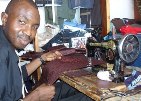  If you buy fabric you fancy or have a craving for your own African clothing,
it is easy something sewed in any style you desire, perfectly fitted
to your own personal bod. An amazing service at amazing costs.
If you buy fabric you fancy or have a craving for your own African clothing,
it is easy something sewed in any style you desire, perfectly fitted
to your own personal bod. An amazing service at amazing costs.
There are
tailoring shops and stalls virtually everywhere in the Bakau area, simply
look around for signs as you ply the streets of New Town and Bakau.
 An inexpensive option is the tailoring shop at the
President's Award Scheme (go through the Rhun Palm Restaurant to emerge
in the back of the Scheme; the
tailoring shop is in the long building in front of you on your left,
so walk forward a few steps and turn left to reach the sidewalk of this
building, and the shop is the second door from the far end). The process
of getting clothes made is simple—buy fabric at the market and give
it to the tailor.
An inexpensive option is the tailoring shop at the
President's Award Scheme (go through the Rhun Palm Restaurant to emerge
in the back of the Scheme; the
tailoring shop is in the long building in front of you on your left,
so walk forward a few steps and turn left to reach the sidewalk of this
building, and the shop is the second door from the far end). The process
of getting clothes made is simple—buy fabric at the market and give
it to the tailor.
 1. Material can be bought at the market, either a craft market or a
regular market (Banjul is highly recommended for selection; Serrekunda
is a bit closer but the shops farther in between). Fabric is usually
sold at a fixed price, though this is sometimes bargain-able, depending
on how much or what you are buying. The best bet might be to ask if
they can reduce the price for you, and they will usually be honest if
it is a fixed price.
1. Material can be bought at the market, either a craft market or a
regular market (Banjul is highly recommended for selection; Serrekunda
is a bit closer but the shops farther in between). Fabric is usually
sold at a fixed price, though this is sometimes bargain-able, depending
on how much or what you are buying. The best bet might be to ask if
they can reduce the price for you, and they will usually be honest if
it is a fixed price.
Plain, solid, cotton is roughly $2 per meter. Linen fabrics are far
cheaper than you would pay in the U.S., at about $6 per meter. Beware
that many fabric shops sell pre-cut swatches of bright prints—six yards
is standard, enough to make African style garments. If the fabric you
want is flat and folded neatly, it would be a good idea to ask if they
can cut it for you before you set your heart on it, or else you will
have to buy all six yards.
 2. Go to the tailor with your fabric and a clear idea of what style
clothing you want, whether it be a dress, pants, shirt, skirt, or even
suit jacket and pants. The tailor might sketch what he perceives as
your request, which you can approve or make changes to. By far the easiest
approach is to provide a tangible example from your existing wardrobe—bring
in a pair of pants that can be a model for the pants to be.
2. Go to the tailor with your fabric and a clear idea of what style
clothing you want, whether it be a dress, pants, shirt, skirt, or even
suit jacket and pants. The tailor might sketch what he perceives as
your request, which you can approve or make changes to. By far the easiest
approach is to provide a tangible example from your existing wardrobe—bring
in a pair of pants that can be a model for the pants to be.
 3. The tailor will take your measurements. Agree on a price for the
garment, and a time when you should retrieve it.
3. The tailor will take your measurements. Agree on a price for the
garment, and a time when you should retrieve it.
 4. Return to pick it up with cash in hand. Though it won't necessarily
be ready on the specified day, as tailors work on Gambian time like
everyone else. Try on the piece of clothing before leaving—the tailor
can make any necessary adjustments for a more suitable size.
4. Return to pick it up with cash in hand. Though it won't necessarily
be ready on the specified day, as tailors work on Gambian time like
everyone else. Try on the piece of clothing before leaving—the tailor
can make any necessary adjustments for a more suitable size. |



 An inexpensive option is the tailoring shop at the
President's Award Scheme (go through the Rhun Palm Restaurant to emerge
in the back of the Scheme; the
tailoring shop is in the long building in front of you on your left,
so walk forward a few steps and turn left to reach the sidewalk of this
building, and the shop is the second door from the far end). The process
of getting clothes made is simple—buy fabric at the market and give
it to the tailor.
An inexpensive option is the tailoring shop at the
President's Award Scheme (go through the Rhun Palm Restaurant to emerge
in the back of the Scheme; the
tailoring shop is in the long building in front of you on your left,
so walk forward a few steps and turn left to reach the sidewalk of this
building, and the shop is the second door from the far end). The process
of getting clothes made is simple—buy fabric at the market and give
it to the tailor.